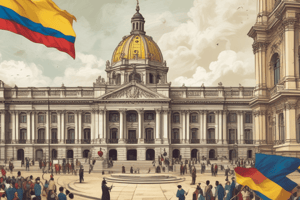Podcast
Questions and Answers
Which section of Article One grants Congress the power to regulate interstate and international commerce?
Which section of Article One grants Congress the power to regulate interstate and international commerce?
- Section 7
- Section 8 (correct)
- Section 9
- Section 10
Which section of Article One establishes the compensation, privileges, and restrictions of those holding congressional office?
Which section of Article One establishes the compensation, privileges, and restrictions of those holding congressional office?
- Section 5
- Section 4
- Section 6 (correct)
- Section 3
According to Article One, how can Congress override a presidential veto?
According to Article One, how can Congress override a presidential veto?
- With a two-thirds vote in both chambers of Congress (correct)
- With a simple majority vote in both chambers of Congress
- With a three-fourths vote in both chambers of Congress
- With a unanimous vote in both chambers of Congress
Which section of Article One places limits on the power of Congress, prohibiting bills of attainder and other practices?
Which section of Article One places limits on the power of Congress, prohibiting bills of attainder and other practices?
What did the Framers explicitly express by stipulating qualifications for voting in Congressional elections?
What did the Framers explicitly express by stipulating qualifications for voting in Congressional elections?
According to Article I, how often is Congress required to assemble?
According to Article I, how often is Congress required to assemble?
According to Article I, what is the minimum vote required by Congress to override a presidential veto?
According to Article I, what is the minimum vote required by Congress to override a presidential veto?
Which of the following is a power of Congress according to Article I?
Which of the following is a power of Congress according to Article I?
What is the subject to presidential veto according to Article I?
What is the subject to presidential veto according to Article I?
According to Article I, what is the role of the vice president of the United States in the Senate?
According to Article I, what is the role of the vice president of the United States in the Senate?
Flashcards are hidden until you start studying
Study Notes
Article I of the United States Constitution: Legislative Powers
- Senate consists of two senators from each state, serving six-year terms; originally elected by state legislatures, now directly elected
- Various rules for the Senate, including the vice president of the United States as the president of the Senate
- States have power to regulate congressional election process; Congress can alter or make its own regulations
- Congress required to assemble at least once per year
- Both houses of Congress have the power to judge their own elections, determine qualifications of members, and punish or expel members
- Compensation, privileges, and restrictions of those holding congressional office established
- Procedures for passing a bill outlined; subject to presidential veto, which can be overridden by Congress with a two-thirds vote of both chambers
- Enumerated powers of Congress, including taxation, defense, regulation of commerce, coinage, borrowing money, establishing federal courts, raising and supporting armies and navies, calling forth the militia, and declaring war
- Congress has the power to establish a federal district to serve as the national capital and administer that district
- Congress granted the power to make laws necessary and proper to carry out its enumerated powers and other powers vested in it
- Limits placed on the power of Congress, including banning bills of attainder and other practices
- Limits placed on the states, prohibiting them from entering into alliances with foreign powers, impairing contracts, taxing imports or exports above the minimum level necessary for inspection, keeping armies, or engaging in war without the consent of Congress
Studying That Suits You
Use AI to generate personalized quizzes and flashcards to suit your learning preferences.




